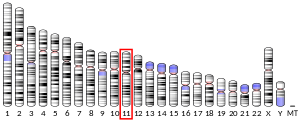^ a b c GRCh38: Ensembl release 89: ENSG00000148943 – Ensembl , May 2017^ a b c GRCm38: Ensembl release 89: ENSMUSG00000027162 – Ensembl , May 2017^ "Human PubMed Reference:" . National Center for Biotechnology Information, U.S. National Library of Medicine .^ "Mouse PubMed Reference:" . National Center for Biotechnology Information, U.S. National Library of Medicine .^ Jo K, Derin R, Li M, Bredt DS (Jun 1999). "Characterization of MALS/Velis-1, -2, and -3: a family of mammalian LIN-7 homologs enriched at brain synapses in association with the postsynaptic density-95/NMDA receptor postsynaptic complex" . J Neurosci . 19 (11): 4189–99. doi :10.1523/JNEUROSCI.19-11-04189.1999 PMC 6782594 PMID 10341223 . ^ "Entrez Gene: LIN7C lin-7 homolog C (C. elegans)" .^ a b c Leonoudakis D, Conti LR, Radeke CM, McGuire LM, Vandenberg CA (Apr 2004). "A multiprotein trafficking complex composed of SAP97, CASK, Veli, and Mint1 is associated with inward rectifier Kir2 potassium channels" . J. Biol. Chem . 279 (18): 19051–63. doi :10.1074/jbc.M400284200 PMID 14960569 . ^ a b Leonoudakis D, Conti LR, Anderson S, Radeke CM, McGuire LM, Adams ME, Froehner SC, Yates JR, Vandenberg CA (May 2004). "Protein trafficking and anchoring complexes revealed by proteomic analysis of inward rectifier potassium channel (Kir2.x)-associated proteins" . J. Biol. Chem . 279 (21): 22331–46. doi :10.1074/jbc.M400285200 PMID 15024025 .
Maruyama K, Sugano S (1994). "Oligo-capping: a simple method to replace the cap structure of eukaryotic mRNAs with oligoribonucleotides". Gene . 138 (1–2): 171–4. doi :10.1016/0378-1119(94)90802-8 . PMID 8125298 . Suzuki Y, Yoshitomo-Nakagawa K, Maruyama K, Suyama A, Sugano S (1997). "Construction and characterization of a full length-enriched and a 5'-end-enriched cDNA library". Gene . 200 (1–2): 149–56. doi :10.1016/S0378-1119(97)00411-3 . PMID 9373149 . Bécamel C, Alonso G, Galéotti N, Demey E, Jouin P, Ullmer C, Dumuis A, Bockaert J, Marin P (2002). "Synaptic multiprotein complexes associated with 5-HT(2C) receptors: a proteomic approach" . EMBO J . 21 (10): 2332–42. doi :10.1093/emboj/21.10.2332 . PMC 126011 PMID 12006486 . Hori K, Konno D, Maruoka H, Sobue K (2003). "MALS is a binding partner of IRSp53 at cell-cell contacts" . FEBS Lett . 554 (1–2): 30–4. Bibcode :2003FEBSL.554...30H . doi :10.1016/S0014-5793(03)01074-3 PMID 14596909 . S2CID 30329043 . Leonoudakis D, Conti LR, Radeke CM, McGuire LM, Vandenberg CA (2004). "A multiprotein trafficking complex composed of SAP97, CASK, Veli, and Mint1 is associated with inward rectifier Kir2 potassium channels" . J. Biol. Chem . 279 (18): 19051–63. doi :10.1074/jbc.M400284200 PMID 14960569 . Leonoudakis D, Conti LR, Anderson S, Radeke CM, McGuire LM, Adams ME, Froehner SC, Yates JR, Vandenberg CA (2004). "Protein trafficking and anchoring complexes revealed by proteomic analysis of inward rectifier potassium channel (Kir2.x)-associated proteins" . J. Biol. Chem . 279 (21): 22331–46. doi :10.1074/jbc.M400285200 PMID 15024025 . Petrosky KY, Ou HD, Löhr F, Dötsch V, Lim WA (2006). "A general model for preferential hetero-oligomerization of LIN-2/7 domains: mechanism underlying directed assembly of supramolecular signaling complexes" . J. Biol. Chem . 280 (46): 38528–36. doi :10.1074/jbc.M506536200 PMID 16147993 . Mendes CC, Gomes DA, Thompson M, Souto NC, Goes TS, Goes AM, Rodrigues MA, Gomez MV, Nathanson MH, Leite MF (2006). "The type III inositol 1,4,5-trisphosphate receptor preferentially transmits apoptotic Ca2+ signals into mitochondria" . J. Biol. Chem . 280 (49): 40892–900. doi :10.1074/jbc.M506623200 PMID 16192275 . Bohl J, Brimer N, Lyons C, Vande Pol SB (2007). "The stardust family protein MPP7 forms a tripartite complex with LIN7 and DLG1 that regulates the stability and localization of DLG1 to cell junctions" . J. Biol. Chem . 282 (13): 9392–400. doi :10.1074/jbc.M610002200 PMID 17237226 . Onda T, Uzawa K, Nakashima D, Saito K, Iwadate Y, Seki N, Shibahara T, Tanzawa H (2007). "Lin-7C/VELI3/MALS-3: an essential component in metastasis of human squamous cell carcinoma" (PDF) . Cancer Res . 67 (20): 9643–8. doi :10.1158/0008-5472.CAN-07-1911 hdl :10130/633 . PMID 17942893 .






